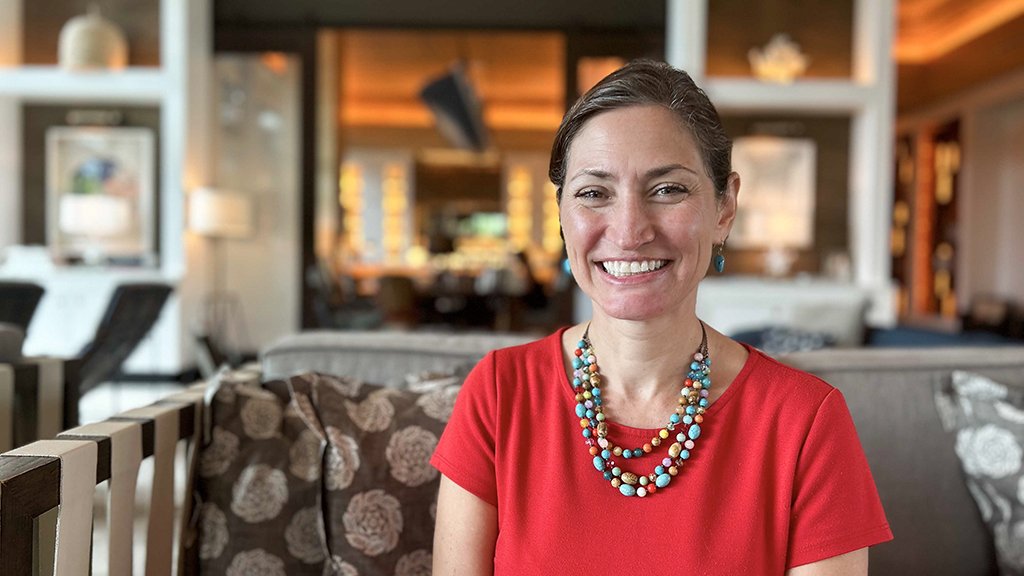What does it take to adapt to working life on a tropical island, leaving behind the hustle and bustle of a big city?
Valerie Hoppe, Director of People and Culture at Kimpton Seafire Resort and Spa, has been living in the Cayman Islands for 18 years after growing up in land locked in the American Midwest so it’s safe to say she's got plenty of expertise on this subject.
Recently, Valerie was kind enough to chat with us and share the insights she’s gained from her exciting international journey in hospitality to reveal the challenges, joys, and experiences unique to island life.
The Initial Struggle
Valerie's migrant story began when she moved from the U.S. and lived in massive urban destinations like Miami, Madrid, and Mexico City, before heading to the Cayman Islands for a two-month task force assignment. The shift from life in a large city to a small island with only around 55,000 residents at the time was a drastic change.
"It was really rough adapting at first," she says, recounting her initial struggle with the small-town feeling. “The absence of the anonymity you have in the big city is something that definitely takes some time to adjust to.”
But it wasn't all difficult. The island's weather and incredible diversity were aspects she loved right away. And as time went on, she found her niche, eventually falling in love with island life. "I met my husband here. We have two children, and it's a wonderful place to have kids. It's super safe."
Adjusting to a New Pace
Valerie suggests newcomers should embrace the local culture and mindset. "Adjusting to a slightly slower pace outside of the hotel and really embracing the local culture helps," she advises. “The balance this pace brings can be refreshing, but it may seem dull if you’re used to the fast life of a big city.”
Finding a Hobby and Building Connections
If you’re wondering how you’ll spend your time outside of work, Island settings have many activities to offer, “From diving, sailing, running clubs, to the local theater, there's something for everyone. I took up diving as a hobby which led to a whole new network outside of work,” she says.
Living on an island also creates unique bonds and friendships, as many are in the same situation of living far away from home. "Your colleagues become like your family."
Integration and Embracing Diversity
With over 100 nationalities in the Cayman Islands, diversity is both a challenge and a benefit. Integrating oneself is not only about survival; it's about thriving and enjoying the richness the island has to offer. "You really are forced to integrate yourself and because of that there's a connection between expats I haven’t found anywhere else.”
Ready for a Caribbean island adventure? Check out the exciting career opportunities available in the Cayman Islands on Hosco today!
Community Integration in the Hospitality Industry
For hospitality professionals relocating to an island, integrating into the local community isn't just encouraged; it's essential in order to truly connect with the island's way of life. The focus on community participation isn't confined to the workplace. It extends into collaborating closely with the local community to create an environment where professionals can learn, grow, and build connections.
"Actively participating in the community is part of what we believe in. It's about supporting and nurturing those who aspire to be in the industry, and also learning from each other," Valerie says.
Activities Nurture Relationships
The commitment to community in the Cayman Islands hospitality sector includes various initiatives that promote wellness and environmental awareness. From community beach cleanups to coral restoration projects, there are many ways for employees to get involved, find friends, and learn about the local environment.
Valerie offers insight into these unique opportunities: "You can actively participate in restoring coral or planting new coral. It's very interesting and a great way to get involved in the local community and meet people that you're not meeting every day on the line in the kitchen or at your hotel."
Embracing the Local Culture
Understanding and embracing local culture is a vital aspect of living and working in an island setting. "When you move to an island, you need to really wrap your arms around that culture and learn about it. It's part of the fun of living somewhere else, having a deeper connection with the community and not feeling isolated," Valerie says.
The benefits of cultural immersion extend beyond personal enrichment. Professionals equip themselves with valuable tools for future adventures. Valerie sees this as a transformative experience: "I've learned about Caribbean cooking, different points of view from mine, working with people from different cultures. When I take that next step in the world, I have that as a tool in my toolbox. Not only culinary Itbut just culturally."
Being an Ambassador for the Community
Valerie's perspective emphasizes the broader role that hospitality professionals play on an island. "We need to be ambassadors and integrate ourselves in the community because we're a part of society here, too. If you do that, you’ll be able to make a bigger impact and have a more fulfilling experience," she explains.
Valuable Insights for Island Newcomers
Relocating to a tropical paradise can sound like a dream. But, drawing from her experience, Valerie provides some tangible insights for those considering the leap. "There are multiple facets to island life that aren’t immediately apparent,” she began.
Yet, the challenges are more than just the muggy weather; the economic aspects are vital too. "Due to an island’s reliance on imports, living costs can be surprisingly high,” Valerie pointed out. Potential newcomers should diligently research the cost of living and evaluate if it aligns with their expected salary and lifestyle. “It's possible to find affordable housing, but an understanding of the overall expenses is crucial."
Concluding her advice for potential island migrants, she shared a practical tip, “In the initial months of your move, goods can be imported duty-free. I wish I'd known this, as it would have prompted me to bring along more of my essentials from the start."
The Work-Life Balance Equation
Contrary to common assumptions, the lines between work and leisure may be less blurred on an island when compared to a big city.
Valerie explains why this might be the case: "I would say I have a better work-life balance here than I would have in a big city. There's less of a commute. I leave work and within 10 minutes I'm home. And so I have more time to myself than I would have if I lived somewhere else."
Opportunities and Considerations for Relocation
Beyond the allure of life in paradise, it's important to recognize the challenges and opportunities of relocation. The logistics may be more complex, especially for those with families.
"When you come from abroad, you'll need to get a work permit, and there are other requirements such as earning over a certain amount of money to be able to support yourself. Schools here are private, and that becomes more expensive. So ideally, the opportunity is easier for somebody who is either younger or able to come unattached. Or, at least, without children," she says.
So, the path may be relatively straightforward for individuals or couples seeking to make the move, but for entire families, especially those not entering at a senior or executive level, it’s more of a challenge.
Changing Recruitment Dynamics
The shift towards upscale luxury doesn't just redefine guest experiences; it also reshapes recruitment strategies. "If we're considering someone from overseas, they should ideally possess luxury experience and fit a specific personality profile – someone dedicated to service excellence and passionate about building genuine connections. They have to tick all the boxes," Valerie says.
"From a recruitment viewpoint, overseas applicants with luxury hotel experience have a distinct advantage. However, when it comes to local recruits, especially locals or permanent residents, we're a bit more flexible," she says. “This flexibility comes from a commitment to train the local community, considering the limited availability of five-star luxury training options on the island.”
In conclusion, moving to an island setting for work can be challenging but it is also an incredibly rewarding experience. Learning how to adapt to an entirely new setting will help you grow both personally and professionally. Working on an island gives you a unique opportunity to connect with your surroundings in a way that you may never be able to in a city destination.
If Valerie’s story has inspired you to take the leap and move to a tropical island for the next chapter of your career, check out the job opportunities in the Caymans available on Hosco today and start packing your bags!




